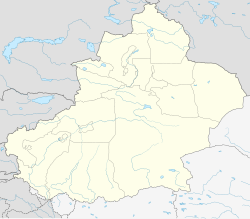Hotan
|
Hotän 和田市 • خوتەن شەھىرى |
|
|---|---|
| County-level city | |
 |
|
| Location in Xinjiang | |
| Coordinates: 37°06′N 80°01′E / 37.100°N 80.017°ECoordinates: 37°06′N 80°01′E / 37.100°N 80.017°E | |
| Country | People's Republic of China |
| Autonomous region | Xinjiang |
| Prefecture | Hotan |
| Seat | Nurbag Subdistrict (奴尔巴格街道) |
| Area | |
| • Total | 85,035 km2 (32,832 sq mi) |
| Elevation | 1,382 m (4,534 ft) |
| Population (2010 Census) | |
| • Total | 322,330 |
| • Density | 3.8/km2 (9.8/sq mi) |
| Time zone | China Standard (UTC+8) |
| Postal code | 839000 |
| Area code(s) | 0903 |
| GDP (2012) |
CNY 4.071 billion USD $665.15 million |
| GDP per capita |
CNY 12,630 USD $2,062 |
| GDP Growth |
|
| Local languages | Uyghur, Standard Chinese |
| License plate prefix | 新R |
| Website | Hotan Government Website (in Chinese) |
Hotan (Uyghur: خوتەن, Хотән, ULY: Xoten, UYY: Hotǝn?), also transliterated from Chinese as Hetian (Chinese: 和田; pinyin: Hétián), is a major oasis town in southwestern Xinjiang, an autonomous region in western China. The city proper of Hotan broke off from the larger Hotan County to become an administrative area in its own right in August 1984. It is the seat of Hotan Prefecture.
With a population of 322,300 (2010 census), Hotan is situated in the Tarim Basin some 1,500 kilometres (930 mi) southwest of the regional capital, Ürümqi. It lies just north of the Kunlun Mountains, which are crossed by the Sanju, Hindutash and Ilchi passes. The town, located southeast of Yarkant County and populated almost exclusively by Uyghurs, is a minor agricultural center. An important station on the southern branch of the historic Silk Road, Hotan has always depended on two strong rivers - the Karakash River and the White Jade River to provide the water needed to survive on the southwestern edge of the vast Taklamakan Desert. The White Jade River still provides water and irrigation for the town and oasis.
...
Wikipedia

